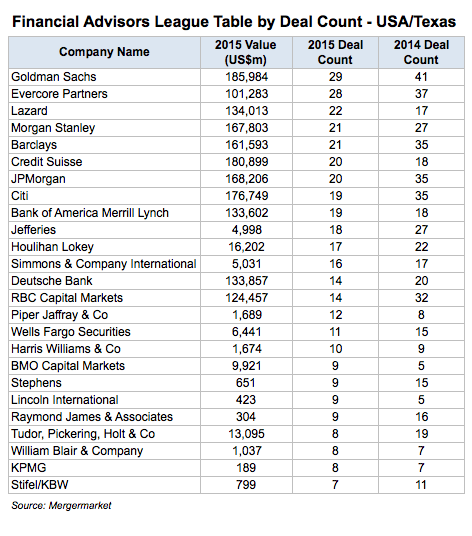By Mark Curriden
(Feb. 8) – Investment banks that focus heavily on the oil and gas sector in Texas took a significant hit in 2015 as the number of deals in the oil patch plummeted, according to the independent research firm Mergermarket.
Those same Dallas and Houston financial advisers are likely to face another topsy-turvy year, except those with expertise in bankruptcy restructuring and reorganization, which analysts predict could have a record year of work ahead.
Mergermarket reports that the numbers of mergers, acquisitions, joint ventures and divestitures involving businesses headquartered in Texas dropped 23 percent last year.
M&A activity in the energy sector declined about 30 percent across the U.S. and about 40 percent in Texas, according to Mergermarket.

“Banks and financial advisors that normally do a lot of work in oil and gas deals saw many of those transactions dry up,” says Mergermarket analyst and writer Chad Watt. “Energy counts for a significant number of deals in Texas and that means the financial advisers in Texas are going to be much more affected by the decline in commodities, which has led to a decline in deal activity.”
Some financial advisers – Tudor Pickering Holt, RBC Capital, JPMorgan, Citi and Barclays – were hit harder than others. Only a handful of investment banks – Lazard, Credit Suisse, Piper Jaffray, BMO Capital and Lincoln International – increased the number of Texas-based deals they handled.
Sixteen of the 25 most active financial advisers participated in fewer deals in 2015 than they did a year earlier.
“There are other business sectors that have significant exposure to the issues in oil and gas than others,” says Rick Lacher, managing director of Houlihan Lokey in Dallas. “Manufacturing and industrial are two areas not doing as well.”
Mergermarket reports that Houston-based Tudor Pickering Holt witnessed the most significant decline – nearly 57 percent – in advising businesses headquartered in Texas.
In 2015, Tudor Pickering Holt was the financial adviser in eight Texas deals with a combined value of $13.1 billion, which compares to 19 transactions in 2014 valued at $30.3 billion. The firm, which has energy as its primary focus, ranked 11th in deal making in 2014, but dropped to 22nd in 2015.

Tudor Pickering Holt had a record year in 2014, as Texas experienced a record year in M&A. Lawyers and corporate general counsel say that Tudor Pickering Holt would be a huge beneficiary if the oil and gas M&A dam breaks in the second half of 2016, as many are predicting.
Watts and others say that financial advisers who focus on oil and gas are working on deals, but very few of the deals are getting done because there remains a wide gap between the seller of the depressed assets and the buyers or investors.
RBC Capital witnessed the second biggest decline. It was ranked sixth in deal making in 2014 but dropped to 14th last year. Texas companies chose RBC to be the financial adviser in 14 deals in 2015 versus 32 such transactions a year earlier.
That being said, RBC was one of a handful of investment banks involved in Dell’s $67 billion acquisition of data storage company EMC in October. In fact, the Dell transaction was so large and involved so many advisers that it skewed the statistics. JP Morgan, Credit Suisse, Barclays, Goldman Sachs, Citi, Bank of America Merrill Lynch and Deutsche Bank also advised Dell, while EMC used Morgan Stanley and Evercore.
Citi and JPMorgan, according to Mergermarket, advised in 35 Texas deals in 2014, but only 19 and 20 respectively in 2015.
Credit Suisse actually increased its M&A activity in Texas in 2015, going from 18 deals in 2014 to 20 transactions last year. Credit Suisse also advised Cameron in its $14 billion sale to Schlumberger and it advised NXP in its $16 billion acquisition of Freescale Semiconductor.
In fact, Credit Suisse was ranked seventh in 2014 in deal value at $61.6 billion, but jumped to second in 2015 with a total deal value of $181 billion.
A few investment banks with a significant Texas presence may have suffered during the past year, but they could experience a boom in business in the coming months if they have significant bankruptcy practices.
“There are a handful of financial advisers – Moelis, Lazard, Houlihan Lokey and Evercore – that have strong restructuring and reorganization groups and they are much more prepared to take advantage of the wave that is coming,” says Deloitte Principle William Snyder, who leads the firm’s corporate restructuring practice and is based in Dallas.
